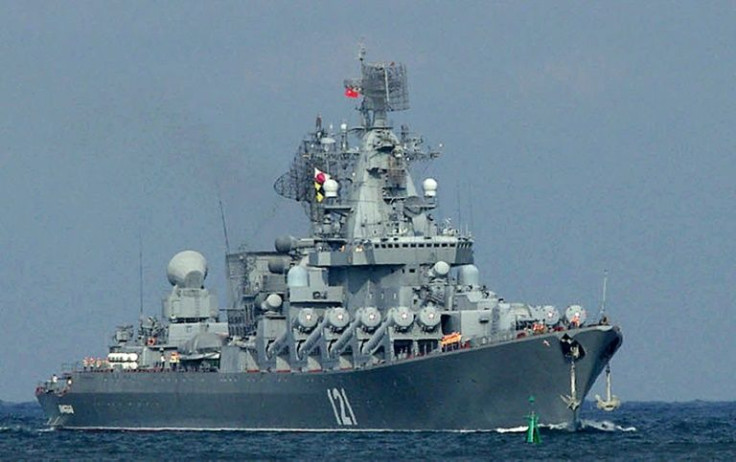Moskva's Sinking Leaves Russia's Black Sea Fleet Defenseless Against NATO Carriers
KEY POINTS
- Ukrainian forces claimed they hit the vessel with Neptune anti-ship missiles
- Moskva reportedly could take on the U.S. and NATO aircraft carriers
- Moskva's sinking has raised concerns about Russia's naval competence
Russia's Defense Ministry confirmed Thursday the sinking of its guided-missile cruiser Moskva, a day after Ukrainian forces claimed they had hit the vessel with Neptune anti-ship missiles.
Military analysts say the Moskva's loss will make a huge dent to Russia's Black Sea Fleet, something on the same scale as the U.S. Navy losing a battleship during World War II, or an aircraft carrier today.
According to Russian state media, the Moskva sank while it was being towed to port; it lost stability due to the hull damage received during a fire from the detonation of ammunition. There is no way to confirm whose version is true — whether the ship was lost to enemy missiles, or exploding ammunition.
It was not without reason that naval experts had called Moskva a significant addition to Russia's naval force and the pride of the Russian naval fleet in the Black Sea. The Slava-class vessel was said to possess the firepower to take on the U.S. and NATO aircraft carriers by overwhelming them with a barrage of of anti-ship and anti-aircraft missiles as well as torpedoes and naval guns, and it was also equipped with close-in missile defense systems to increase its survival chances. Originally commissioned into the Soviet navy as the Slava in the 1980s, it was renamed Moskva in 1995.
"Only the loss of a ballistic missile submarine or the Kutznetsov (Russia's lone aircraft carrier) would inflict a more serious blow to Russian morale and the navy's reputation with the Russian public," Carl Schuster, the former director of operations at the U.S. Pacific Command's Joint Intelligence Center, told CNN.
The Russian navy has long relied on its missile cruisers as a smart and cheaper way to level the playing field with the U.S. Navy, without having to build out costly aircraft carrier groups and fielding them. In other words, each missile cruiser was a countervailing force for an aircraft carrier that the U.S. Navy or NATO could field. While Russia has many other similar, or better capable, ships, its Black Sea fleet has been significantly weakened by this loss.
The sinking of Moskva impacts the Russian war effort in other ways too. According to Sidharth Kaushal, a research fellow at The Royal United Services Institute, the Moskva was the sole vessel in the Russian fleet equipped with S-300F missiles for wide-area air defense. "It has thus provided air cover to other vessels during their operations, which have included coastal bombardments and amphibious feints. In the absence of the Moskva, the fleet lacks vessels with a comparable air defense suite, and will find it riskier to conduct similar operations," he wrote in the Daily Telegraph.
Alessio Patalano, professor of war and strategy at King's College in London, too said losing the warship would be a "massive blow" for Russia.
"Ships operate away from public attention and their activities are rarely the subject of news. But they are large floating pieces of the national territory, and when you lose one, a flagship no less, the political and symbolic message -- in addition to the military loss -- stands out precisely because of it," he was quoted by CNN as saying.
The sinking of Moskva has also raised concerns about Russia's abilities and naval competence, especially since President Vladimir Putin had announced a mission to restore the navy's capabilities, morale and professionalism a decade ago. Many analysts think the incident reflects Russian "deficiencies," including flawed air defense and weak safety procedures on the ship.

© Copyright IBTimes 2024. All rights reserved.




















